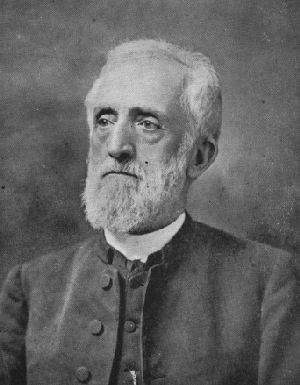
Bishop Oscar Penn Fitzgerald
- Born Caswell County 1829
- Journalist
- Methodist Bishop
- CA Superintendent of Public Instruction
- Died 1911 Tennessee

Bishop Oscar Penn Fitzgerald |
|
Fitzgerald, Oscar Penn (24 Aug. 1829-5 Aug. 1911), Methodist clergyman, editor, educator, and author, was born in Caswell County near Ruffin, the son of Richard and Martha Jones Hooper Fitzgerald. He attended local schools until he was thirteen and then went to Lynchburg, Va., to work for the Lynchburg Republican for six years. When his father enlisted for the Mexican War, Oscar returned home and taught in a country school in Rockingham County to help support his mother. After his father's return he worked in newspaper offices in Richmond, Va., Columbia, S.C., and Macon, Ga.
In 1853, Fitzgerald entered the ministry of the Methodist Episcopal church, South, by way of the Georgia Conference and was stationed at Andrews Chapel in Savannah. In 1854, he married Sarah Banks of Georgia and soon afterward they left for California on a missionary assignment. There he became editor of the Pacific Methodist Advocate and the Christian Spectator. From 1867 to 1871 he served as state superintendent of education in California; in this position, to which he was elected by popular vote, he was instrumental in the establishment of an institution that has since become the University of California at Berkeley. During this period he offered himself for the Democratic nomination for the U.S. Senate.
In 1878, he went to Nashville, Tenn., headquarters of the Methodist Publishing House, to become editor of the Nashville Christian Advocate, the official organ of the southern church. With 25,000 subscribers it had the widest circulation of any newspaper. After twelve years in the post, he and Atticus Greene Haygood (1839-96) were elected bishops of the Methodist Episcopal Church, South. Fitzgerald served from Maryland to California.
He was the author of twenty books. His excellent command of the English language and keen sense of humor, much of it aimed at himself, make his California Sketches--first published in 1878 and reprinted many times--lively reading. He produced book-length biographies of Dr. Thomas O. Summers, John B. McFerrin, Judge Augustus B. Longstreet, and others. In politics, he demonstrated a "stanch and outspoken allegiance to the Confederacy." His final years were spent on the campus of Vanderbilt University, and he died at Monteagle, Tenn. Because of his "wit, geniality, and sweet Christian spirit," Fitzgerald came to be known as the "St. John of Methodism." For many years one of his sons was a professor at Duke University.
Was born in Caswell County, North Carolina, August 24, 1829. Mr. Fitzgerald belongs to an old Virginia family, of Nottoway County, where the family connection is now large and respectable. His early education was such as could be obtained in the average country schools of the time, and the first real educational impulse was received by him at the famous "Oak Grove Academy," Rockingham County, North Carolina. The teacher was Booker Doss, whose discipline was as rigid as his instruction was thorough. Following an irresistible bent he entered the office of the Lynchburg Republican, where his preference for journalism was confirmed. At the age of twenty he had already acquired local reputation as a writer. For a time Mr. F. taught school, being at the same time an earnest student and writer for the press; was connected with and wrote for the Richmond Examiner. Mr. Fitzgerald removed at twenty-one from Virginia to Georgia for the sake of the climate. At Macon, in the latter State, assisted in the preparation of the school history of United States and other textbooks, and was on eve of taking the editorship of a journal, when a great change in his purposes and plans took place, and he entered the ministry of the Methodist Church. At the call of the church he came to California, in 1855. Spent the first two years in Sonora, Tuolumne County; went thence to San Jose; thence to San Francisco, to take charge of the Pacific Methodist, the church organ. This paper was to subsequently merged in The Spectator.
In 1867 he was elected Superintendent of Public Instruction of the State of California, and served four years that office. During his administration the University of California was organized, and the State Normal School permanently located and equipped; various reforms were made, and great advancement realized. Mr. F. had the honor of being nominated for the office of Superintendent of Public Instruction, by acclamation, four different times. He has been connected with the Methodist Church and ministry since early manhood, and then pastor of city churches, editor of church organs, President of the Pacific Annual Conference, and thrice elected as a delegate to the quadrennial general conference of the church. Mr. Fitzgerald has filled the chair of Homiletic in Pacific Methodist College, and was for a time President of the institution. Was four years Regent of the University of California, and chairman of the Committee on Instruction. Mr. F. was treasurer and originator of the movement in California for the relief of sufferers in the South, in 1867, by which nearly $100,000 in gold was forwarded to the relief committees of the several Southern States. Mr. F. is now editor and publisher of Fitzgerald' s Home Newspaper and Educational Journal, which is achieving a wide circulation and extensive popularity. The degree of Doctor of Divinity was conferred on Mr. F. by the Southern University in 1868. As preacher, lecturer, editor, State Superintendent and college agent, the people of California know Mr. Fitzgerald pretty well. No man ever had better friends, or more freely forgave his enemies. He loves a good joke, and is liberal in the true sense of the word. The Doctor is Chaplain of the present Assembly, and also a Committee Clerk. It is said of him that he is a genial gentleman and prays well.